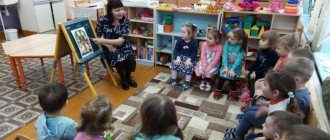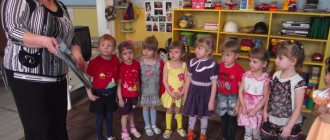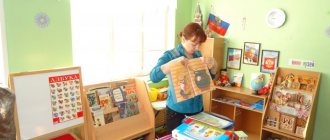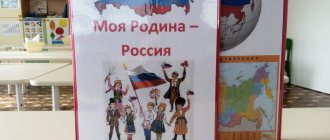Tasks:
- Obtaining and expanding the knowledge of students and pupils about Russia: its history, traditions, culture, law, etc.
- Formation of patriotic feelings and consciousness of students on the basis of historical values and the role of Russia in the destinies of the world, preservation and development of pride in their country, its outstanding achievements in the field of politics, economics, science, sports, culture.
- Instilling a sense of pride, deep respect and veneration for the symbols of the Russian Federation, historical shrines of the Fatherland.
- Cultivating international feelings in students using the example of acquaintance with Udmurtia and the city of Izhevsk.
- Formation of a humanistic attitude towards the surrounding world and people.
Younger ages and folklore
Folk culture – what is it? How is she vaccinated? You cannot say to a child: “Love, this is your culture.” It is absorbed from infancy along with folk games, nursery rhymes, and sayings. With good Russian folk tales and cheerful characters - this is how patriotic education begins among children of primary preschool age. In routine moments (washing, walking, getting ready for bed), the teacher skillfully weaves elements of Russian folk art so that the little citizen already begins to feel like a part of his people.
Current issues of patriotic education
Sport games
Patriotic education of preschool children according to the Federal State Educational Standard implies the education of a physically healthy individual. Therefore, physical development is an integral part of the educational process. Sports games and competitions not only develop children, but also form a sense of team, unity of interests, and strengthen family ties and traditions.
You can hold competitions between groups of the same age on a relevant topic, for example, dedicated to Russian heroes. During the holiday, children get acquainted with Russian epics about heroes and their military exploits. The following competitions are held:
- "Sharpshooter" - throwing balls at a target.
- Tug of war.
- “Fast Rider” is a relay competition in racing on rubber horses or large balls.
- “The Strongest” - pushing your opponents beyond the mat with your shoulder.
- “Heroic Help” - disassemble the entrance to the cave into cubes and save the beautiful maiden.
Joint competitions between children and parents play a special role. To celebrate Defender of the Fatherland Day for students in the senior and preparatory groups, you can organize a war game “Zarnichka”, in which fathers and sons participate in relay races, and mothers and daughters participate in competitions for fans. This game fosters a sense of collectivism and patriotism, creates interest in performing physical exercises, develops basic physical qualities, and introduces people to the traditions of big-time sports.
Creation of a life safety cabinet
Out-of-school education is interesting and productive, but the main foundations for patriotic education are laid in the classroom. An important lesson in terms of developing civic consciousness is life safety.
In schools, they sometimes take this subject lightly, considering it a kind of auxiliary elective. Not all educational institutions have a special office, so we will give basic tips on how to create one. It is important to set up a corner of military Glory; materials on educating schoolchildren based on the traditions of previous generations are posted here. Symbols of Russia are placed on the walls; information about compatriots and heroes of Russia can be indicated.
The life safety classroom can be used not only for specialized classes in the subject. At its base, Courage lessons, classes in history or literature with a patriotic component are held, and meetings with military personnel and veterans are organized here. In a specialized life safety room, it is convenient to watch patriotic videos and conduct military-applied classes.
Patriotic education at school. Goals and objectives
The period of study in a comprehensive school is quite an impressive period of time. At school, a child goes a long way from preschool childhood to full adulthood. That is why the school faces difficult tasks , to become not just an educational institution, but a full-fledged social institution that educates a moral, harmonious personality. Patriotic education is not a whim of the state. This is a necessary condition for raising worthy members of our future society.
Being a full-fledged multifaceted educational activity, patriotic education includes several aspects (target, social, functional, organizational).
The goal is to implement state policy in the field of patriotic education of secondary school students.
Fundamentals of moral and patriotic education
Patriotic education should become part of the educational process, and also be firmly integrated into extracurricular and extracurricular activities.
When solving the problem of patriotic education, any teacher needs to build his work based on the following conditions and individual characteristics of younger schoolchildren:
- taking into account the relevance of the knowledge provided for children of the specified age;
- the educational process must be continuous and systematic;
- it is necessary to select an individual approach to each child, taking into account his personal characteristics;
- various types of activities should be used by him based on the age characteristics of younger schoolchildren.
System of moral values - a list of components
As the main parameters of the success of the educational activities of each teacher, it is worth highlighting the social activity of younger schoolchildren, their desire for constant self-improvement, a developing sense of self-worth, the presence of general moral qualities, an objective assessment of the child as a citizen, a patriot.
Work program on Civic-Patriotic Education
Explanatory note
Civic education is one of the priorities of educational work in a boarding school. Patriotism is one of the basic components of an individual, a citizen, expressed in a feeling of love, pride, recognition of one’s Fatherland, its history and culture, traditions, awareness of civic duty to it, readiness to protect its interests, and the formation in students of a sense of readiness to fulfill their civic duty and constitutional duties.
A citizen and patriot begins at school: before becoming a citizen and patriot of the Motherland, a student must learn to be a citizen and patriot of his school, know its history, and actively participate in all the affairs of the school.
Work program for organizing extracurricular educational activities on the basics of civic consciousness developed by educators of the Municipal State Educational Institution for Orphans and Children Without Parental Care “Special (Correctional) Boarding School for Orphans and Children without Parental Care with Disabilities health No. 66" VIII type is a step towards solving the problem in educating a citizen. This program was written based on the processing of sample programs recommended by the Ministry of Education of the Russian Federation, Federal Law dated December 29, 2012 No. 273-FZ FZ (as amended on May 7, 2013 with amendments that entered into force on May 19, 2013) “On Education in the Russian Federation” ; Federal State Educational Standard for Primary General Education (approved by order of the Ministry of Education and Science of Russia dated October 6, 2009 No. 373, registered with the Ministry of Justice of Russia on December 22, 2009 registration number 17785) with amendments (approved by order of the Ministry of Education and Science of Russia dated November 26, 2010 No. 1241, registered in the Ministry of Justice of Russia on February 4, 2011, registration number 19707); manual for educators and teachers, approved by the Ministry of Education of the Russian Federation authors: Khudenko E.D., Gavrilycheva G.F., Selivanova E.Yu., Titova V.V. “Organization and planning of educational work in a special (correctional) boarding school, orphanage.”
This work program is part of the program for organizing extracurricular educational activities for pupils (students) in grades 1-9 of a boarding school and, taking into account age, is designed for certain age groups - for primary schoolchildren (grades 1-4), younger teenagers (5-7 grades) and older teenagers (grades 8-9).
The work program was developed according to the block of the foundations of civic consciousness and includes the following areas: civic-patriotic and legal education. Each direction, taking into account its age group, is divided into modules: “I am a citizen”, “Me, my family and school”, “Patriot, citizen of Russia”, “School of Pedestrian Sciences”, “ABC of Human Rights” - junior (1- 4 grades) and middle (5-7 grades) levels and “The Origins of National Culture”, “Legal Culture” - senior (8-9 grades) level. The section “Holidays of Russia and the World” is studied throughout the year, chosen by the teacher himself at will
. Each of the modules involves the organization of a certain type of extracurricular activities for students and is aimed at solving its own pedagogical problems.
Preparatory group - “We are patriots”
Children 6-7 years old are essentially school-age children. Their ability to listen carefully (as well as hear) allows them to have deeper and more thoughtful conversations. When talking with children in the preparatory group, the teacher encourages them to analyze and reason. Children of six years old have very sensitive feelings. They respond vividly to stories about the exploits of heroes and the sorrows of war. When talking with older children, you need to be extremely tactful. In a conversation about the Great Patriotic War, the emphasis should be on the feat of the people, their unity and courage, but not on the personality and nationality of the enemy. When talking about the exploits and glory of the Russian (Soviet) people, it is unacceptable to touch upon the honor of representatives of other nationalities. This can lead to national conflicts, both in kindergarten and outside its walls. Delicacy, a sense of tact, together with the conviction of the teacher, are the key to correct and effective education.
Modern problems of patriotic education
Formation of a sense of patriotism in children at an early age
As mentioned earlier, a huge role in instilling a sense of patriotism in a child belongs to his parents. Many moral qualities are developed in children in the early grades. Parents begin to lay the foundations of patriotism by awakening in the child a wonderful feeling of love for green trees, fragrant flowers, the surrounding nature, such a close and dear home. True love and devotion to the homeland begins in a child with manifestations of love for his own mother, father, grandmother, a pleasant feeling of being needed, a warm attitude and love, care with which he is surrounded.
Patriotic education begins from the first days of school
The feeling of love for one’s own people begins to form from love for surrounding peers and adults.



